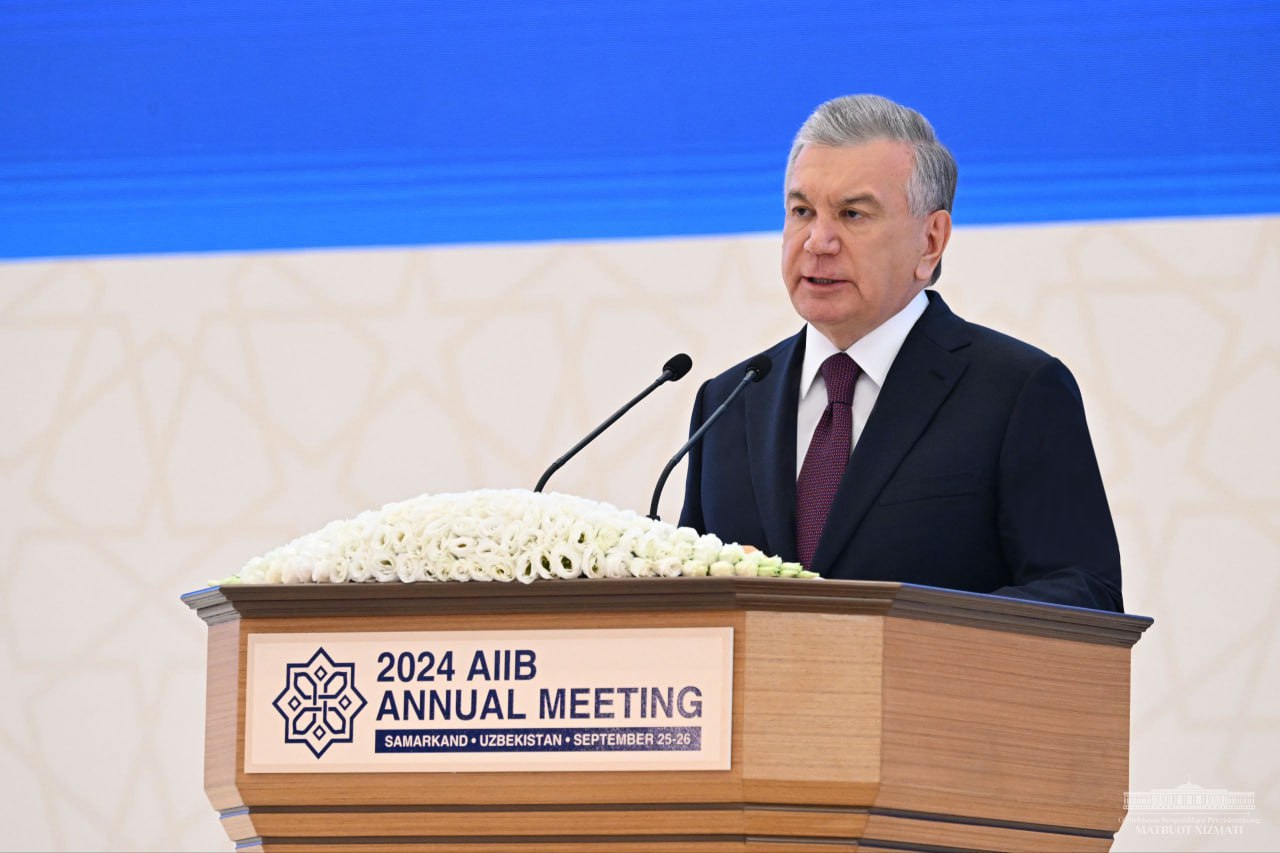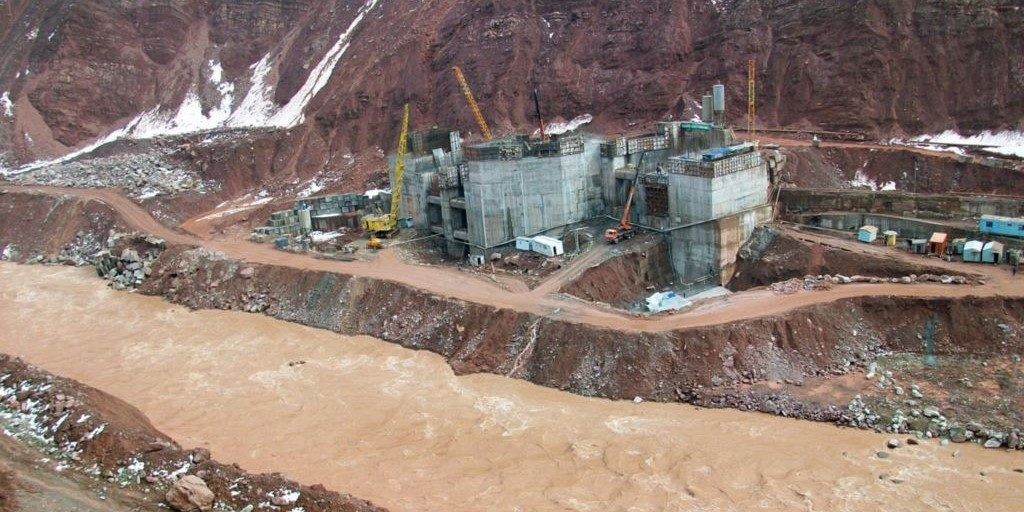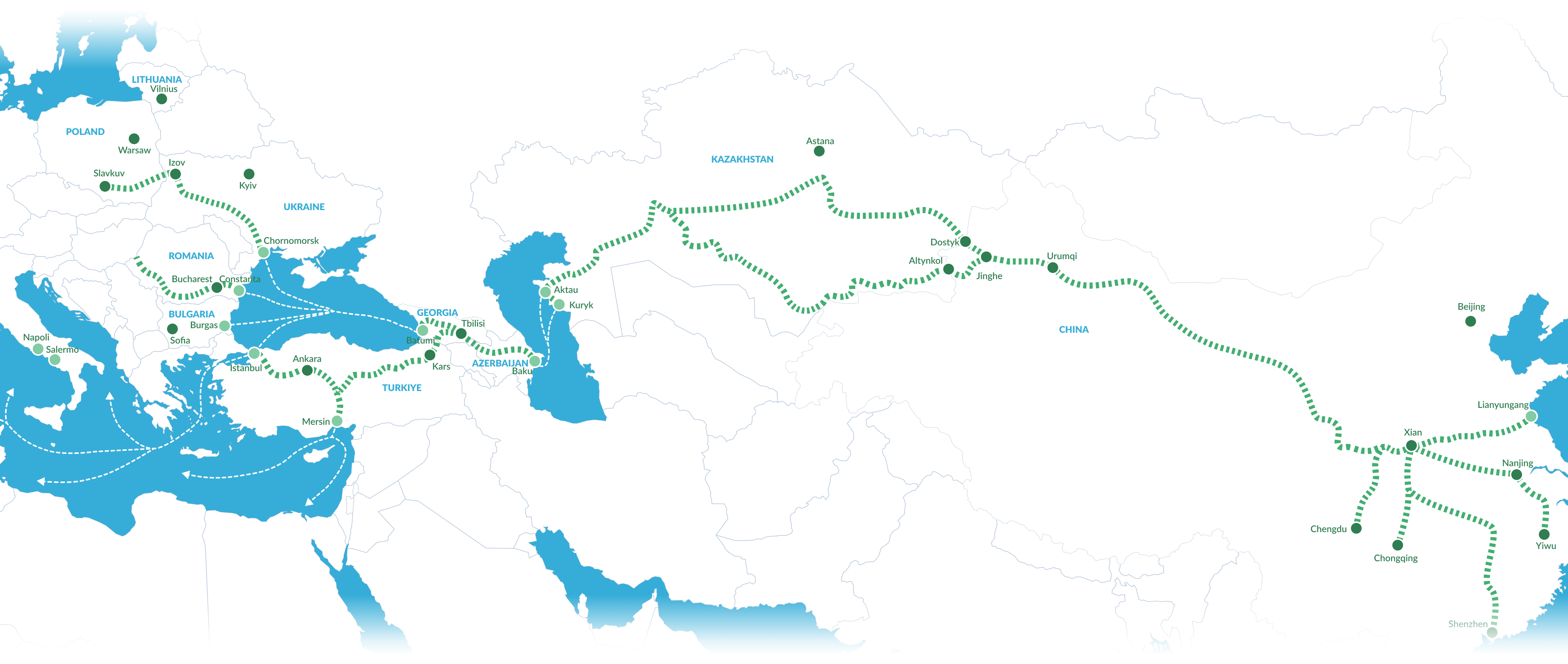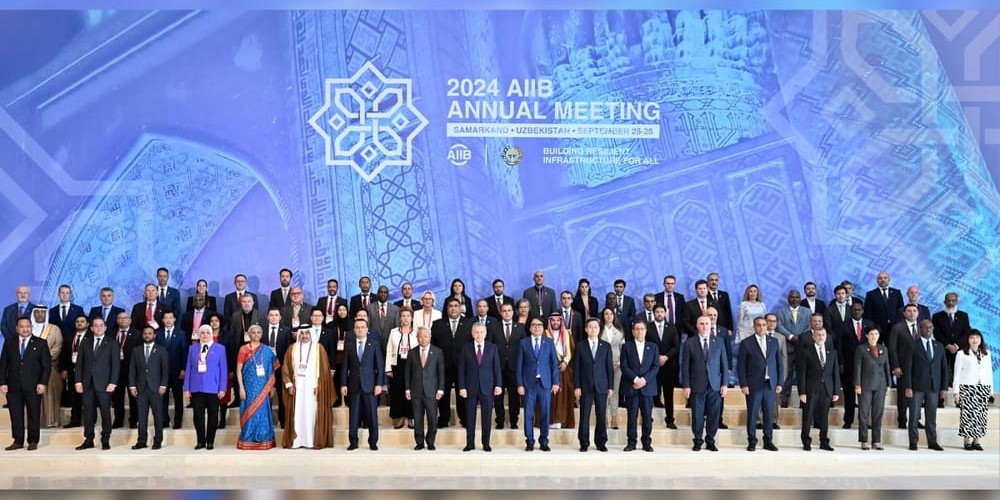This week, the media in Central Asia discussed the economic growth forecasts and fiscal analyses for Central Asian countries contained in the Asian Development Bank’s (ADB) recent Asian Development Outlook report. They also noted Kazakhstan’s plans to increase oil production and Saudi Arabia’s pledging $100 million towards completing the Rogun HPP in Tajikistan. Several sources remarked on the fall in Tajikistan’s electricity exports and the introduction of rationing. Other outlets also reported on the Asian Infrastructure Investment Bank’s (AIIB) Board of Governors meeting in Samarkand and the various agreements that were concluded. Some sources mentioned that Kazakhstan and Uzbekistan agreed to install water metres along the Syr Darya River.

Uzbekistani President Shavkat Mirziyoyev speaks at the 9th annual meeting of the AIIB Board of Governors. Source: KUN.uz
Economic Outlook
The Asian Development Bank (ADB) has revised Kazakhstan’s GDP growth slightly downwards to 3.6% in 2024 (Kursiv). In April 2024, the ADB forecasted economic growth of 3.8% for the year. However, the bank revised its outlook due to weak service sector expansion, lower oil production, flood damage, and a slowdown in investment. Nevertheless, Kazakhstan’s long-term growth prospects remain optimistic, with the bank predicting growth of 5.1% in 2025. Tax revenue is also down due to weaker-than-expected oil duty and VAT receipts. This decline has been offset by transfers from the National Fund of Kazakhstan, whose reserves amounted to roughly $100 billion. Inflation also slowed to 8.9% in the first seven months of the year, compared to 17.2% in 2023. Overall, the ADB noted that to enhance growth in the long term, Kazakhstan needs to address its persistent fiscal challenges.
Moreover, the report also predicted that economic growth in Uzbekistan will reach 6% this year (UZ Daily). While the report indicated growth of 8.2% for the first six months of the year in Tajikistan, it expects growth to moderate slightly, with overall annual growth forecasted at 6.5% (Asia Plus). Finally, they expect Kyrgyzstan’s economy to grow 6.3% this year and 5.8% in 2026 (ADB's Asian Development Outlook). Nevertheless, the ADB revised its growth forecast for Central Asia and the Caucasus region upwards from 4.3% in April to 4.7% in September (AKIpress).
Energy
At the 29th Kazakhstan International Oil & Gas Exhibition and Conference (KIOGE), Kazakhstani energy minister Almassadam Satkaliyev announced that Kazakhstan plans to increase oil production to 100 million tons (730 million barrels) per year by 2030 (The Astana Times). He noted that in 2023, oil production in Kazakhstan totaled 655 million barrels, of which 517 million were exported. According to the minister, Kazakhstan had also increased exports along new routes to Azerbaijan and Europe (Kazinform). In 2022, KazMunayGas and Azerbaijan’s SOCAR agreed to transport 1.5 million tons of oil along the Baku-Tbilisi-Ceyhan (BTC) pipeline. However, following fresh negotiations, this was increased to 2.2 million tons. Last year, Kazakhstan also delivered 1 million tones to refineries in Germany through the Atyrau-Samara pipeline. The contract has been renewed for another year with the planned delivery of 1.2 million tons. However, Germany recently requested Kazakhstan to double oil exports to 2.5 million tons (Interfax). Despite Kazakhstani President Kassym-Jomart Tokayev indicating Kazakhstan’s willingness to increase oil exports, it remains to be seen if they have the capacity to do so.
The Saudi Development Fund has allocated $100 million toward completing the Rogun HPP in Tajikistan (The Times of Central Asia). The announcement was made by Saudi Arabia’s ambassador to Tajikistan, Walid bin Abdulrahman Al-Rashidan, at a press conference to commemorate the 94th anniversary of Saudi Arabia. Currently, the estimated cost of completing the dam stands at $6.4 billion (Daryo). Once complete, Tajikistan will export 70% of the electricity produced by the dam to neighbouring countries. However, a report from the Eurasian Fund for Stabilisation and Development (EFSD) warns that the increase in construction cost is increasing Tajikistan’s debt burden to unsustainable levels and that the country will require additional budgetary support from international institutions.

Construction works on the Rogun HPP in Tajikistan. Source: CABAR
Barqi Tojik (Tajikistan’s power company) introduced electricity rationing in rural areas on September 22 (Asia Plus). They stated that this was due to a lack of precipitation in the region of the Vakhsh River over the last year. When combined with increasing demand from a growing population, experts anticipate shortages of one billion kilowatt-hours this year. According to reports, residents in rural areas only receive electricity for 8 to 10 hours daily. In previous years, Barqi Tojik implemented restrictions in warmer months to maintain water levels behind the dams that account for most of the country’s electricity generation capacity, thus guaranteeing supplies during the colder winter months. The renovation of the Nurek HPP, which accounts for 50% of Tajikistan’s electricity, is ongoing and will be completed in the next ten years. The ongoing work at key HPPs and the decline in water levels in the country’s reservoirs have impacted Tajikistan’s electricity exports, the cornerstone of its economy. Revenues from electricity exports declined by $2.8 million to $82.3 million in the first eight months of this year (Daryo).
Trade
Kazakhstani President Kassym-Jomart Tokayev has ratified an agreement to create a simplified customs corridor between the member states of the Organisation of Turkic States (OTS) (Kazinform). According to Nurlan Bekenov, a Senate deputy, “The ratification of the agreement will contribute to the development of trade and economic relations and strengthen mutual economic integration between the OTS member states.” Kazakhstan’s trade with OTS states reached $10.4 billion in the first eight months of this year. The agreement aims to increase the efficiency of customs operations, reduce paperwork, and streamline border controls.

TransCaspian International Transport Route. Source: Kaz Inform
At the first meeting of the working group on cargo transportation along the Trans-Caspian International Transport Route (TITR) at the Kazakhstani Transport Ministry, the Chinese and Kazakhstani delegations discussed the volumes of cargo to be moved along the TITR from China (Kazinform). Both sides agreed to increase the amount of container trains along the route to 600 in 2026, 1000 in 2027, and 2000 in 2028. Overall, they aimed to ensure the transshipment of 85000 containers annually from 2026-2029. The Kazakhstani side also pledged to construct the necessary infrastructure to ensure the attainment of these goals. Specifically, they mentioned plans to build a container hub at Aktau port that will handle 300000 containers annually. Overall, they stated that these projects will increase the capacity of Kazakhstan’s ports to 30 million tons annually.
Investment
The European Bank for Reconstruction and Development (EBRD) approved a $20 million finance program for the First MicroFinanceBank of Tajikistan for green lending and supporting entrepreneurship among women and young people (Asia Plus). It will ensure that companies have better access to green technologies and climate adaptation tools in the future. The first package consists of three loans totalling $10 million. The first loan of $4 million is part of the Tajikistan Green Economy Financing Facility II (GEFF II). It will enable borrowers to access green solutions that promote the efficient and sustainable management of land and water supplies. The second loan of $3 million falls under the EBRD’s Youth in Business program and will provide targeted support to small and medium businesses owned by people under 35. The final $3 million loan is provided by the EBRD’s Women in Business initiative. They also agreed to contribute a further $5 million to the GEFF II and Youth in Business programs in the near future. Since its establishment, the ERBD has invested €992 million in Tajikistan. This week, the EBRD posted its latest growth projections for Central Asia (Daryo). The region will achieve a growth rate of 5.1% this year and 5.9% in 2025 despite challenging climatic conditions.

The 9th annual meeting of the AIIB Board of Governors held in Samarkand. Source: AIIB
The Asian Infrastructure Investment Bank (AIIB) Board of Governors held its annual meeting in Samarkand from September 25-26 (Kun). During the event, leaders and officials from various countries and institutions, such as the World Bank and the Asian Development Bank, discussed multiple programs and infrastructure development plans in Asia. Uzbekistani President Shavkat Mirziyoyev was in attendance and addressed the opening plenary session. During his speech, he announced that Uzbekistan planned to invest $30 billion through public-private partnerships to improve key rail and road infrastructure, including a new Tashkent to Bukhara high-speed line, by 2030 (Tashkent Times).
President Mirziyoyev also met with Jin Liqun, President of the AIIB, and signed a roadmap for future projects worth more than $4 billion (UZ Daily). Uzbekistan is already a significant beneficiary of AIIB funding, with existing projects totaling $3 billion. The projects in the updated roadmap cover sectors such as energy, healthcare, transportation, and agriculture, among others. President Mirziyoyev also proposed crafting a Strategic Partnership Program with the AIIB, which would include projects such as the construction of New Tashkent, poverty reduction, and supporting public-private partnerships.
On the sidelines of the meeting, Uzbekistan's Minister of Investments, Industry, and Trade, Laziz Kudratov, met with Nikolai Podguzov, Chairman of the Eurasian Development Bank (EDB). Both sides signed agreements on various projects worth $3.3 billion. They also discussed the EDB’s plans to open a representative office in Tashkent and other initiatives to enhance cooperation and the financing of key projects (UZ Daily).
Last week, the Chinese-Kyrgyzstani Business Forum was held in Xian, China (KABAR). Kyrgyzstan’s National Investment Agency reported that the forum was devoted to strengthening trade relations and improving cooperation in agriculture, energy, and tourism. Overall, ten different trade and investment agreements worth $50 million were signed.
Environment
The water resources ministers of Uzbekistan and Kazakhstan have signed an agreement to install water metering systems at 10 locations along the Syr Darya River (Kun). The Kazakhstani minister, Nurjan Nurjigitov, highlighted that negotiations with international financial institutions are ongoing to fund the project’s implementation. They also discussed the situation at the Naryn-Syrdarya reservoir, the automation of hydro posts, and the digitalization of water accounting (Daryo). The ministers also pledged to continue their countries’ cooperation within the International Fund for Saving the Aral Sea (IFSAS) framework and to advance the development of a Regional Strategy for the Rational Use of Water Resources.

